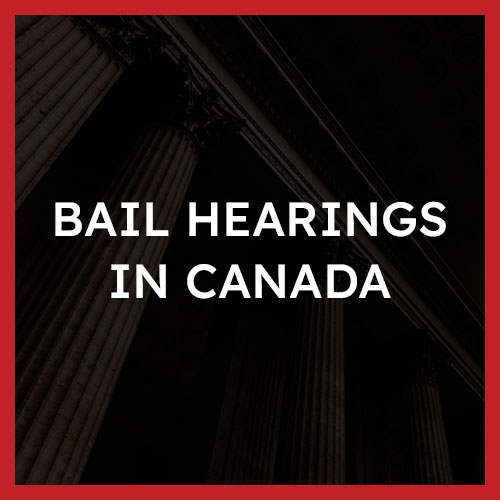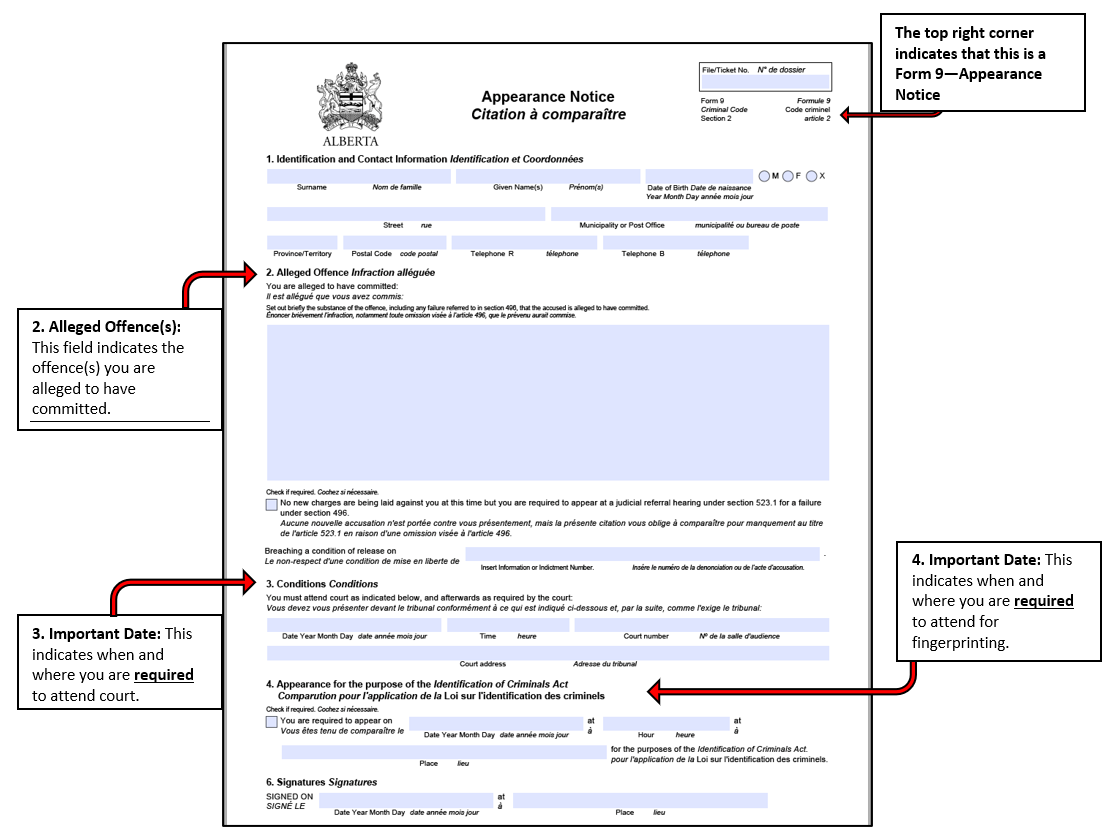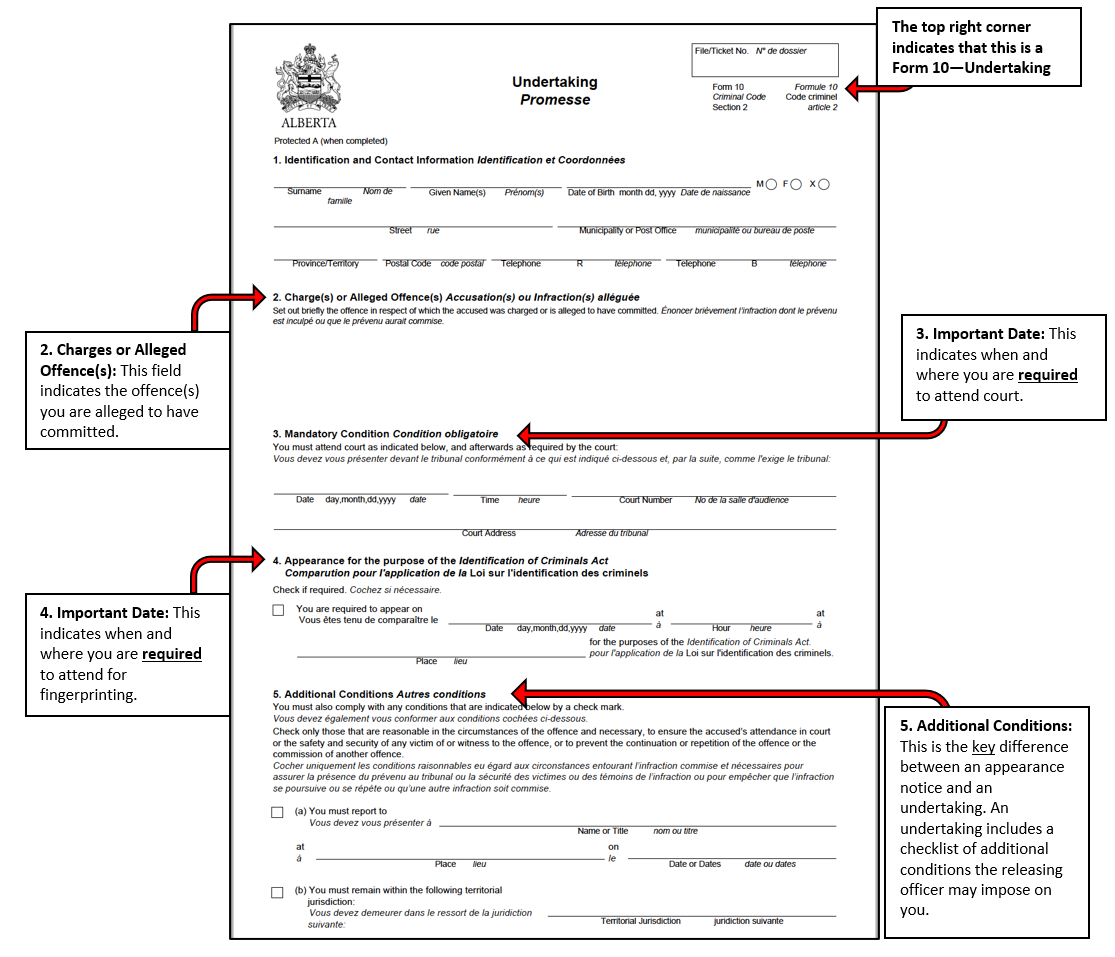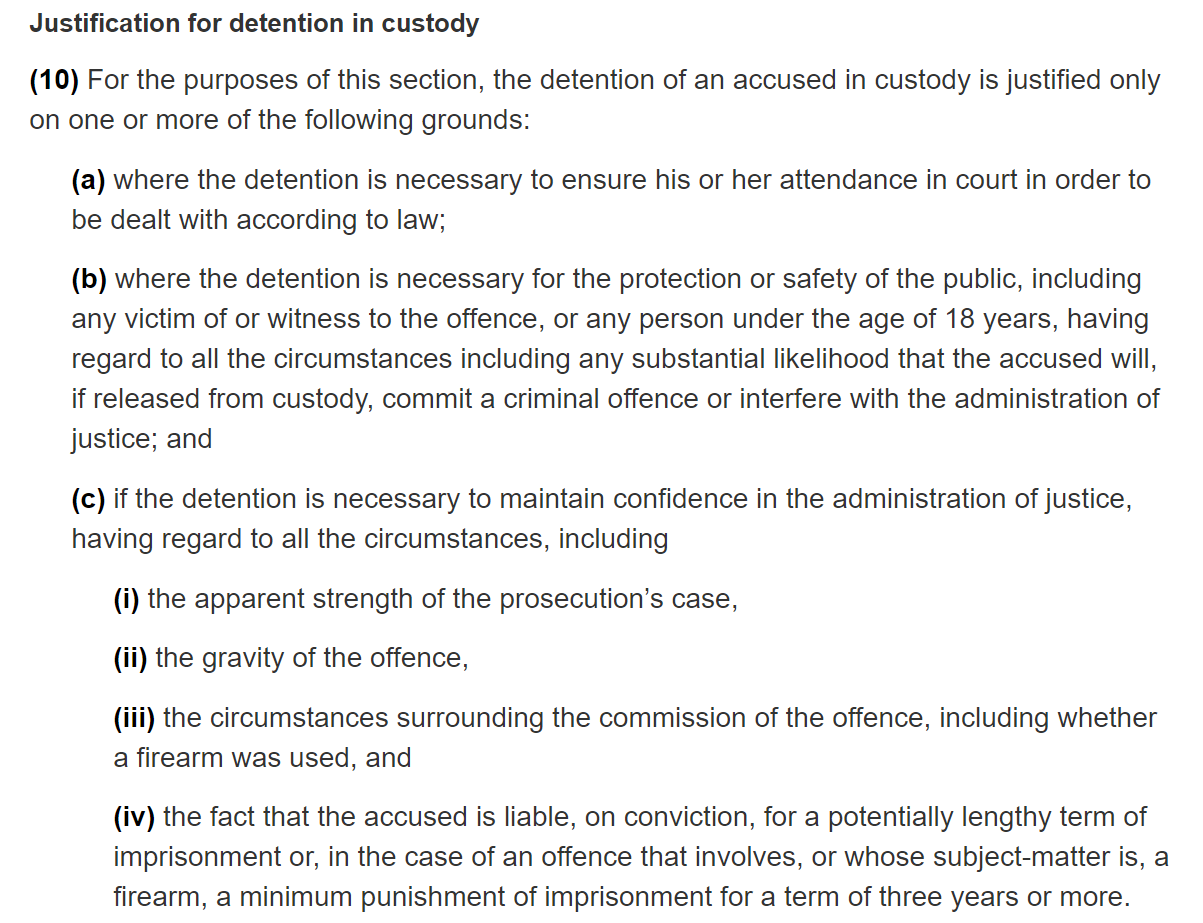Bail Hearings in Canada

Bail may also be referred to as “Judicial Interim Release.” Both terms refer to the temporary release of an accused person while their charges progress through the court system.
The bail process is one of the most fundamental steps in the criminal process. Whether you or someone dear to you is released, and the conditions of that release, will set the stage for the rest of the proceedings.
For many alleged crimes, you or your loved one may be released by a peace officer directly. However, factors such as the circumstances of the crime and the existence of a criminal record may make it necessary to hold a formal bail hearing.
Police agencies have varying policies surrounding whether a person can be released immediately upon being charged, or when they must appear in front of a judge or justice of the peace. The most challenging cases are those in which police policy mandates an appearance in front of a judge or justice of the peace, such as cases involving domestic violence.
In such cases person charged is usually detained in custody for a prolonged period while awaiting the next available justice of the peace or provincial court judge. The police will not release any information, nor will they confirm if the person is being held there unless the caller is a lawyer or the person detained is a minor.
For location-specific information on bail, please select the location nearest you and select “Bail Hearing” from the “Court Process” drop-down menu.
Bail Hearings
What happens at a bail hearing?
After you are arrested and brought into custody prior to trial, a bail hearing will occur within 24 hours of your arrest. The bail hearing is where it will be determined whether you should be kept in custody, released, or if the hearing should be adjourned. Unless the Crown shows cause why you should be held in custody or given strict bail conditions, at the first hearing you should be released.
What to expect at a bail hearing?
Typically, at a bail hearing the Crown will provide a summary of the allegations against you and explain whether they are seeking your detention or consenting to your release on conditions, and what grounds they rely on for their application. When making their application, the type of evidence that the Crown will usually rely on includes the full circumstances of the offence, your existing criminal record, whether you are in a position of reverse onus (see below for further explanation), and what conditions should be imposed on you if you are released.
If you can afford bail, the defence will then typically present arguments as to why detention or strict bail conditions are not warranted in the circumstances. In doing so, defence counsel will likely suggest bail conditions that will result in minimal restriction, but that will also try to address the concerns of the court.
Show cause and why bail can be refused
One term that is often used in the context of bail hearings is ‘show cause’. Show cause refers to the burden placed on the Crown at a bail hearing to show justifiable reasons why an accused should be kept in custody.
In order to show cause, the Crown Prosecutor must demonstrate that your detention is justified on the basis of one or more of the following three grounds. The three grounds that are considered include:
- Primary Ground: the detention of the accused is necessary to ensure the accused’s attendance at court;
- Secondary Ground: the detention of the accused is necessary for the protection and safety of the public from the risk of further crime and to protect witnesses from interference or intimidation; and
- Tertiary ground: the continued detention of the accused is necessary to maintain the confidence of the public in the administration of justice.
While the burden to show cause for continued detention is placed on the Crown at a bail hearing, there are some circumstances where the burden is reversed and you will have the onus of justifying your release. The conditions that trigger this “reverse onus” are:
- Where the Crown Prosecutor is in the process of making an application to have bail revoked because the accused was already released on bail, but breached his or her conditions while on bail;
- Where the accused is charged with breaching bail granted by a judge or justice;
- Where the accused is charged with breaching a conditional sentence order;
- Where the accused is charged with an indictable offence while released on bail for another indictable offence;
- Where the accused is charged with drug trafficking, a serious firearms or weapons offence, a criminal organization offence, a terrorism offence, or a Security of Information Act offence.
The existence of one or more of these conditions will make it significantly more difficult for you to be granted bail prior to trial. It is therefore vital that you seek the assistance of a skilled and experienced criminal defence lawyer to avoid being kept in custody.
What happens after a bail hearing?
If you are granted bail, you will be released on a notice to appear or a recognizance which will stipulate conditions that you must comply with until your matter is resolved. For a detailed discussion on release conditions please see “What conditions will I have if I am released on bail?”
If bail is not granted or the bail conditions that are imposed are found to be too onerous, you can apply for a review of your conditions every 30 days, or more frequently if you are granted permission by the Court to do so. If the Crown Prosecutor and defence are able to reach a mutual agreement with respect to the release conditions, the previous order may be reviewed by the court and replaced.
Types of Release
There are several forms of release available to the police and the court. The most common types are:
- Appearance notices;
- Undertakings; and
- Release orders.
Your circumstances and the type of offence you are charged with will likely dictate the manner in which the police proceed.
Appearance Notice
Release by way of an appearance notice is typically reserved for detained people with little to no prior criminal history, and for relatively low-level criminal charges. For this type of release, police exercise their discretion, and a formal bail hearing is not required.
The release conditions associated with these documents are very minimal. The most important condition is that you attend court on the specified date and continue to attend thereafter as required.
There will also likely be a condition stating that you must attend a police station for the purposes of “identification,” which is a fancy way of saying fingerprinting. It is critical that you do not miss either date, as a warrant will be issued for your non-attendance.
If you have received an appearance notice, this will be indicated at the top of the form. You will also see “Form 9” in the top right corner.
Below is an example of an appearance notice, highlighting the most critical information.

Undertaking
Another common form of release is an undertaking. The police may require that you sign an undertaking if they feel your circumstances require more onerous conditions. Like the appearance notice, an undertaking has two very important dates: the fingerprinting date and the court date. In addition, it can include a variety of conditions.
The most common conditions include:
- Keeping the peace;
- Reporting to the police;
- Curfew;
- No contact with a specified person or persons;
- Non-attendance at a specific address or location;
- No leaving the province; and
- No alcohol.
If any of the conditions the police propose in the undertaking seem excessive, it may be possible to negotiate them. However, if you really want to contest them, you will be held in custody until you are able to appear in front of a judge or justice of the peace.
One of our lawyers can assist in negotiating these conditions with a Crown Prosecutor at or before your first court appearance. If you do sign the undertaking, be sure to follow the conditions until you are able to have them reviewed.
If you have received an undertaking, this will be indicated at the top of the form. Additionally, you will see “Form 10” in the top right corner.
Below is an example of an undertaking, highlighting the most critical information.

Like undertakings, release orders can include many conditions, some which may be difficult to navigate. Our experienced bail lawyers are available to go over your release order in detail to ensure you understand your conditions and explore the possibility of changing them with permission from the Crown or by way of a review hearing.
Factors Considered in Granting Bail
Whether you are trying to convince the police officer, prosecutor, justice of the peace, or judge, there are three key factors that will be considered:
- Whether detention is necessary to ensure you will attend your required court appearances.
- Whether you are likely to commit further crimes if released or if you are a danger to the public.
- Whether granting you bail will cause people to lose confidence in the administration of justice. This last factor includes consideration of the gravity of the offence, as well as the strength of the Crown’s case.
The provision which sets out the specific wording of these three factors is section 515(10) of the Code:

How a Criminal Lawyer Can Help You Get Released Faster
In our experience, the best bail hearings are those that can be concluded by defence counsel’s quick action. Therefore, it is extremely important to contact a lawyer as soon as possible.
The mere presence of a lawyer at a bail hearing can improve your chances of being released, because it shows the court that you have already taken steps to address the charges. Moreover, it helps show that you are less likely to miss an upcoming court date, as you have counsel to remind you of the date and appear for you.
As criminal defence lawyers, we are able to contact the police and the person charged while they are being detained. We will make all reasonable efforts to discuss the file with the “presenting officer” or “duty Crown” and negotiate release without the need for a contested bail hearing.
Although the person in custody must still appear before a judge or justice of the peace, it goes much smoother when the officer or prosecutor in charge is agreeable to release, and we present a joint release plan.
If we cannot convince the presenting officer or prosecutor, there are several options open to us. We can choose to conduct a contested bail hearing in front of a justice of the peace (which must occur within 24 hours of arrest) or adjourn the matter to court on the next sitting day where a judge and Crown Prosecutor will be in attendance.
If the matter is particularly complex, a bail hearing may need to be scheduled several days into the future.
Conducting a bail hearing properly is sometimes more important than any other step in the criminal process (with the exception, perhaps, of the trial). Indeed, an order of detention can impact how the rest of the case is conducted.
Unfortunately, some people spend more time in jail waiting for their trial date than they would even if convicted at trial. As such, we do everything possible to ensure that our clients are released from custody as soon as possible.
We understand it may be tempting to conduct your own bail hearing in hopes of being released sooner, but there are significant risks in doing so:
- You may not know what information is relevant to present to the judge;
- You may not be able to articulate that information in a structured way;
- You may not be able to contact the right people or coordinate the right resources to present a strong release plan;
- You may not have access to the police information package to determine the strength of the Crown’s case, or more importantly, argue the weaknesses in their case;
- Even if you are able to access the police information package, you may not be able to discern the legal issues and arguments that may be relevant to your case;
- Whatever you do say to the court may be used against you in subsequent prosecution or at your trial.
Our key function in relation to your bail hearing is to present the relevant information in a meaningful and understandable way. At the same time, to support your case for release, we can review the merits of the case and point out pitfalls in the Crown’s case. Finally, we can structure our submissions to, as much as possible, insulate you from having that information used against you later.
Frequently Asked Questions
How can I bail someone out of jail?
Our lawyers frequently receive phone calls either from people in custody seeking legal advice, or from friends and family of people who have just been arrested, looking for some guidance as to what to do next. Although the process does have to play itself out once someone is arrested, there are some steps you can take to assist the person in custody.
If your friend or family member has been arrested and you would like to bail them out of jail, you should try to be as accessible as possible by telephone because the person arrested may be calling you for assistance in finding a lawyer for them, or to figure out what to do next.
If your friend or family member does contact you, make sure you write down the following:
- where they are,
- what they are charged with
- who the responsible officer is, and
- the best phone number to call back on to reach the person calling.
Your friend or family member will have the opportunity to call a lawyer from custody as well, and the lawyer they contact will be able to give them some preliminary legal advice free of charge. However, it is unlikely that the person in custody will be able to get a lawyer to do anything more for them without being properly retained. Because the person who is under arrest does not have access to their wallet, this is where your help becomes invaluable. You can be of assistance by contacting a lawyer on their behalf, and likely hiring the lawyer on behalf of the person in custody. Most lawyers can be retained by credit card payment, or through email money transfer, so don’t worry about having to run money over to their office on short notice. If paying by credit card, be prepared to text or email a copy of your ID, as well as the front and back of your credit card. This step is typically necessary to ensure all the information is accurate and legitimate.
As long as you took the time to write down where your friend or family member is, what the charges are, and how to contact them, you can also forward all this information to the lawyer you hire so it makes it easier for the lawyer to assist further.
Hiring a criminal defence lawyer is one of the most important things you can do to assist someone in securing release. A defence lawyer will be able to assist in contacting your loved one while they are held at a District Office or at the Arrest Processing Unit. These locations are not able to release any information about where individuals are being detained, except to a lawyer hired to assist those individuals. A defence lawyer will also be able to attempt to negotiate your loved one’s release with the Crown Prosecutor or litigate their release in a Court bail hearing.
In the interim, you can assist by helping to establish a strong release plan to present to the Crown Prosecutor or the Court. Demonstrating that the detained individual has a stable living situation and employment can be very useful in securing release. To this end, getting letters that prove employment and housing will be of assistance.
Where can I pay bail and how much will bail cost?
Bail can be paid at any bail hearing office in the province. For example, if you are located in Edmonton and would like to pay bail for someone who is detained in Calgary, you can go to the Edmonton bail hearing office and make a payment. Bail hearing offices in major centres like Calgary, Edmonton, Toronto, Vancouver, Winnipeg, etc. are open 24 hours a day, 7 days a week. You can also make a bail payment at a Remand Centre prior to 8:30PM. If you are detained and would like to pay your own bail, you can make a payment after you go in front of the Justice of the Peace from an RCMP station or the Arrest Processing Unit.
How the cost of bail is determined, and how you can lower the cost of your bail
The amount of bail you will be required to pay prior to your release is determined by the seriousness of your charges, your criminal record, and the strength of your release plan. The purpose of the bail is to act as a cash bond with the state that will compel you to appear in Court once you’re released, go through the court system, and eventually present yourself for trial. If your charges are more serious, your cash bail will be higher to prevent you from fleeing to avoid facing your charges. If you have a criminal record which may increase the severity of the sentence that you would receive if convicted, your cash bail will be higher. If you have a history of not complying with court orders, your cash bail amount will also likely be increased accordingly.
If these aggravating factors are not present, it is possible that you will be released on your own recognizance, meaning a stipulated bail amount that you are not required to deposit. It typically ranges from $2,000-$5,000, and you are not required to pay that money unless you breach the conditions of your recognizance or do not appear for court as required.
If you cannot afford the cost of bail, you may be able to get it lowered by developing a strong release plan with the assistance of one of our criminal defence lawyers. Our lawyers will be able to use their experience in conducting bail hearings to assist you with your release plan, and to present your best case for a lower cash bail.
How do I get my friend or family member out on bail?
To assist your loved one in securing bail, there are some steps that you can take. Hiring a criminal defence lawyer is one of the most important things you can do to assist someone in securing release. A defence lawyer will be able to assist in contacting your loved one while they are held at a District Office or at the Arrest Processing Unit. These locations are not able to release any information about where individuals are being detained, except to a lawyer hired to assist those individuals. A defence lawyer will also be able to attempt to negotiate your loved one’s release with the Crown Prosecutor or litigate their release in a Court bail hearing.
In the interim, you can assist by helping to establish a strong release plan to present to the Crown Prosecutor or the Court. Demonstrating that the detained individual has a stable living situation and employment can be very useful in securing release. To this end, getting letters that prove employment and housing will be of assistance.
Can I get bail while my conviction is being appealed?
About The Author
Ask A Question
We endeavor to respond to questions within 24 hours. If your matter is urgent, please call our office or submit a request for a free consultation.





